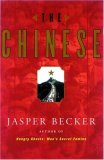Summary | Excerpt | Reviews | Readalikes | Genres & Themes | Author Bio

Critics' Opinion:
Readers' Opinion:
First Published:
Dec 2000, 304 pages
Paperback:
Feb 2002, 493 pages
In the light of what followed, many Chinese intellectuals believe that Mao and his followers had always despised the liberties of Republican China and intended to establish a totalitarian state, copying the Soviet model down to the smallest detail but also attempting to recreate the system of Qinshi Huangdi, the First Emperor. Mao openly admired him and reportedly spent as much time studying imperial tracts on government as those on Marxist dogma. Separating the strands of twentieth-century totalitarianism from China's own totalitarian legacy is not easy. Some Chinese, even now, prefer to draw some sort of comfort from the fact that at least Mao was a homegrown tyrant.
After 1949 Mao set about creating a minutely organized and centralized bureaucratic state in which officials commanded all resources and could intervene in every aspect of life. At the same time a determined effort was made to destroy the 'four olds', that is everything linked to the past.
The history of the Mao era can, at one level, be depicted as a series of political campaigns by Mao to assert and maintain absolute power. In 1956 the Hundred Flowers campaign was launched to encourage free speech under the 2,000-year-old slogan, 'Let a hundred flowers blossom and a hundred schools of thought contend'. Those unwise enough to do so fell victim to the Anti-Rightist campaign the following year, when over half a million intellectuals were punished. In 1958, in an attempt to create a socialist Utopia, Mao instituted the Great Leap Forward, in which the peasantry were stripped of their possessions and amalgamated into giant communes. The famine that resulted led to the death through starvation of over 30 million people. In the wake of the Great Leap Forward, which ended in 1961, the Party split into two factions, one of which advocated limited concessions to the peasants that helped end the famine. Deng Xiaoping was among that faction's adherents.
In order to restore his prestige, in 1966 Mao embarked on the Cultural Revolution, attacking his critics among the leadership, dismantling the bureaucracy, persecuting intellectuals and encouraging young Red Guards to roam free. After his death in 1976, an attempt by the Gang of Four, who included Mao's widow Jiang Qing, to seize power was thwarted and Deng Xiaoping, disgraced during the Cultural Revolution, was rehabilitated. In 1979 he established full control of the Party at the Third Plenum of the Eleventh Party Congress and embarked on a programme of reform.
Mao had ruled as a semi-divine being beyond any law. Much like Qinshi Huangdi, he moved from villa to villa in secret, rarely meeting his subjects or administering the bureaucracy which served him. Most of the institutions first established in the 1950s, including the organs of the CCP, were subsequently ignored or partially disbanded during the Cultural Revolution. This ten-year period is often referred to in China as 'the ten years of chaos' but a faction of the Party remained in control throughout and the People's Liberation Army ran most of the country's institutions. China in the 1970s was a heavily militarized state, and returning the country to civilian rule has been a lengthy process.
Deng Xiaoping's reforms revived many of the issues debated in the first half of the century. Mao had done his utmost to destroy China's traditional culture, the glue which had bound the imperial state together. In place of a shared culture, China now defines itself in strident nationalist and racist terms but the search for wealth, modernity and national strength goes on. There has been a renewed effort to create durable political and legal institutions that will enable the Chinese to absorb modern technology and the elements of a capitalist market economy. Political reform, however, has been slow.
In 1989, the split within the Party between those who wished to modernize the political system and those who feared this would result in the downfall of the Communist totalitarian state emerged into the open. For over two months, students calling for democracy led street protests in almost every city in China. The spark was the unexpected death of the Communist Party General Secretary, Hu Yaobang, a liberal who had been dismissed by the Party's revolutionary gerontocracy. The students who occupied Tiananmen Square in Beijing backed his successor, Zhao Ziyang, who was also pushing forward a programme of political reform. Though these were the biggest political protests in Chinese history, the Communist Party decisively crushed the movement by sending an army to occupy Beijing. Troops backed by hundreds of tanks and armoured vehicles invaded the capital on the night of 3/4 June and fought the demonstrators for control. Since then the Party has remained in power, operating a totalitarian police state, while its sister parties in eastern Europe were swept from power when the Iron Curtain fell later that year. The essence of Chineseness is now often presented by the current rulers as the imperial, totalitarian state, and once again foreigners are accused of plotting to break up China by advocating democracy.
Copyright © 2001 by Jasper Becker.





The House on Biscayne Bay
by Chanel Cleeton
As death stalks a gothic mansion in Miami, the lives of two women intertwine as the past and present collide.

The Flower Sisters
by Michelle Collins Anderson
From the new Fannie Flagg of the Ozarks, a richly-woven story of family, forgiveness, and reinvention.

The Funeral Cryer by Wenyan Lu
Debut novelist Wenyan Lu brings us this witty yet profound story about one woman's midlife reawakening in contemporary rural China.
Your guide toexceptional books
BookBrowse seeks out and recommends the best in contemporary fiction and nonfiction—books that not only engage and entertain but also deepen our understanding of ourselves and the world around us.